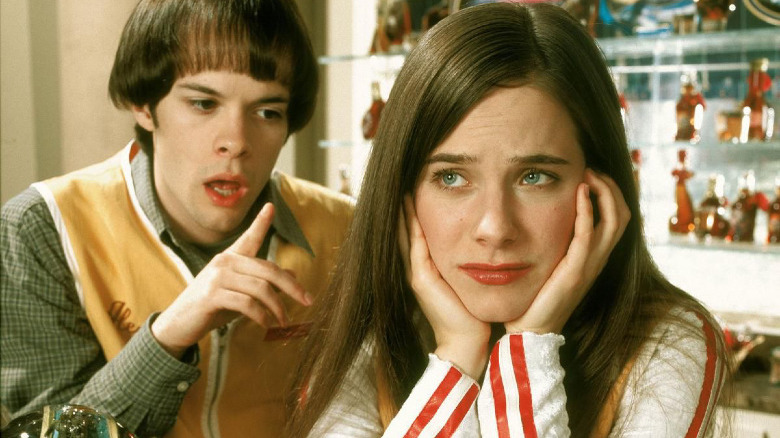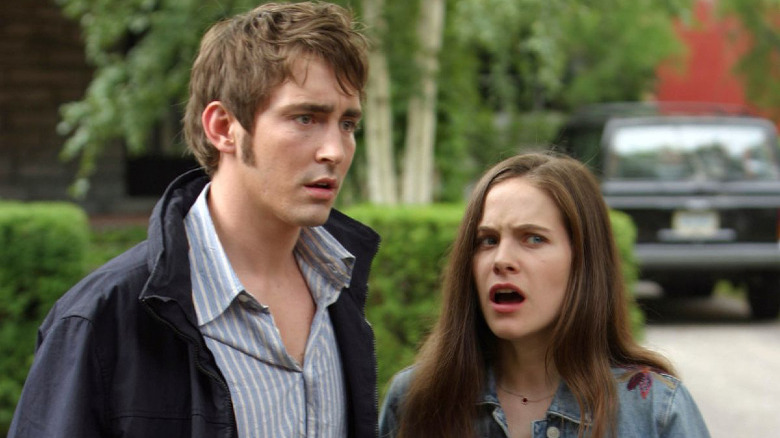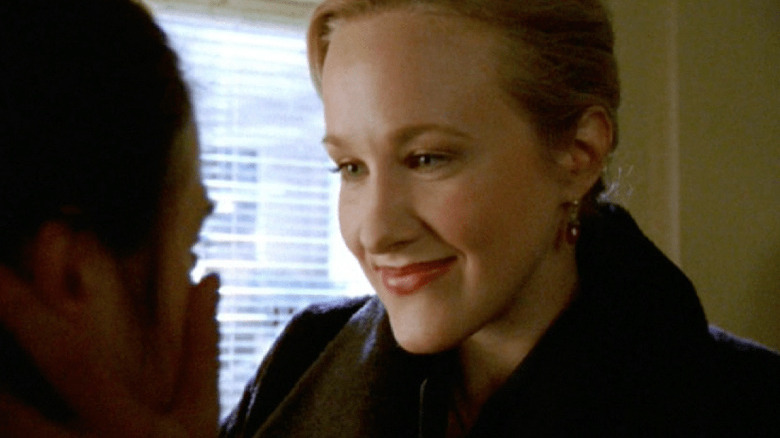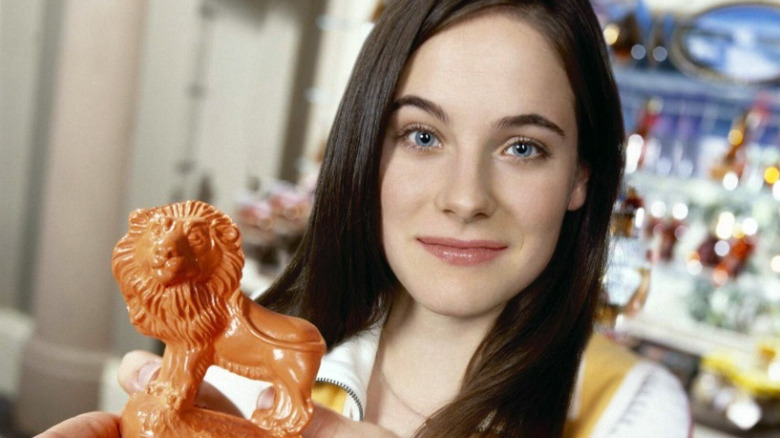TV, Interrupted: Wonderfalls Deserved To Keep Licking The Light Switch
(Welcome to TV, Interrupted, a series where the /Film team remembers, eulogizes, and makes a case for the revival of TV shows we loved that were canceled far too soon.)
Poor Bryan Fuller.
A frequent guest on /Film's TV, Interrupted column, the "Hannibal" and "Pushing Daisies" creator's beautiful, weird TV shows are dripping with style, full of lovably messy characters, and queer as f***. They're also very tricky to market, with premises that refuse to fit neatly into square boxes and stories that meld whimsy with the macabre while still wearing their hearts on their sleeves. It's what makes them baffling to anyone who isn't willing to engage with them on their own peculiar wavelength (not least of all antsy network executives).
"Wonderfalls" was short-lived, even by Fuller's standards, and isn't as well-remembered as his other cult series, yet offers many of the same delights as his better-known creations. The show stars a pre-"Hannibal" Caroline Dhavernas as Jaye Tyler, a caustic 24-year-old who, fresh off earning a degree in philosophy from Brown University, decides to work as a sales clerk at a Niagara Falls souvenir shop (the Wonderfalls Gift Emporium) and live in a trailer at the High and Dry Trailer Park.
Jaye, you see, takes great pride in being the black sheep of a family of over-achieving (mostly) conservatives. Their ranks include her sister Sharon (Katie Finneran), a reputable immigration attorney and closeted lesbian; her brother Aaron (Ned the pie-maker himself, Lee Pace), an avowed atheist who's pursuing a doctorate in comparative religion; her father Darrin (William Sadler), a respected physician who's always meddling in Jaye's life yet shows unwavering love and support for his kids; and Jaye's mother Karen (Diana Scarwid), an award-winning travel guide author who's also an earnest yet overbearing helicopter parent.
One day, however, Jaye's aimless existence is thrown into chaos when random inanimate animalistic trinkets begin giving her cryptic advice (including a tiny wax lion, a brass monkey bookend, and a cow creamer). Stranger still, the more Jaye listens, the more she improves the lives of those around her and, in the process, herself as a person.
Why Wonderfalls was great
The obvious point of comparison for "Wonderfalls" would be Bryan Fuller's "Dead Like Me," a cult series that launched the year before the former arrived in 2004. (Its own tale of woe will have to wait for another day.) Both shows center on disgruntled young women whose lives are upended by higher powers, sending them on a reluctant journey of self-discovery. From there, of course, the two deviate, with "Wonderfalls" focusing on Jaye's adulthood coming of age into someone who slowly accepts that, yes, it's good to care about people other than yourself and to find real meaning in your life.
Indeed, long before the modern era of TV gave us captivating anti-heroines on shows like "Yellowjackets" and "Killing Eve," Fuller and "Wonderfalls" co-creator Todd Holland (a prolific TV vet who did extensive work on "The Larry Sanders Show" and "Malcolm in the Middle") delivered just that with Jaye. She's a character whose contempt for the world is palpable and is constantly saying or doing the wrong thing, which only makes her all the more endearing and relatable. Caroline Dhavernas is perfect in the role, and it's no wonder Fuller wanted to work with her again years later on "Hannibal."
Dhavernas' costars are, by and large, on the same level with her, including an amusingly laid-back Lee Pace as Aaron and Tracie Thoms as Mahandra, Jaye's longtime friend and a fellow cynic with a heart of gold. If Tyron Leitso is less engaging as Jaye's love interest, Eric, it's only because the character is the calm at the heart of the show's storm of deeply-flawed people who all stand to benefit from the good deeds Jaye begrudgingly carries out (many of which, at first, seem like the opposite of "good"). Even Jewel Staite (of "Firefly" fame) gets in on the fun as Eric's estranged wife Heidi, who is as much a screw-up as Jaye in her own way.
Besides great characters, quirky wit, and rich substance, "Wonderfalls" offers style to spare (another core quality of Bryan Fuller's work). Scenes transition like they're photos in one of the ViewMasters customers can buy at Jaye's workplace, and the camera is often whizzing about, whip-panning, or capturing the action at odd angles to highlight the quirky, heightened nature of the show's reality. There are whole episodes shot and lit in ways that emulate the tropes of specific film genres (like noirs and thrillers), as well as fanciful scenes that dive into characters' imaginations.
Even the CGI talking inanimate objects look decent by early '00s standards — although, it's the simple, enigmatic phrases they repeat to Jaye that really stick in your memory ("Get off your ass!," "Lick the light switch," and my personal favorite, "Have a pancake!").
Why Wonderfalls was canceled
Timing, if anything, was against "Wonderfalls." TV shows with a variation on the setup of "young woman gains abilities from a higher power" were definitely having a moment in the early 2000s, between "Tru Calling," "Joan of Arcadia," and, in a different sense, "Dead Like Me." As unalike as they all are beyond that, what once might've felt like an original concept was suddenly overdone by the time "Wonderfalls" dropped.
Then there were the limitations on the show's queer content at the time of its release. In a 2004 interview with After Ellen to promote the show, Fuller revealed the series could not show Sharon and her girlfriend kissing on-screen, stating, "We get letters from the network's standards and practices saying 'Under no circumstances are their lips ever to touch.'" Being who he is, though, he still found a way to make the physical side of their relationship as explicit as possible, even sneaking in a brief shot of them locking lips. (Queer-baiting, thy name is not Bryan Fuller.)
This brings us to the real villain of this story: FOX. The network was notorious at the time for developing intriguing new series only to inexplicably go out of its way to avoid promoting them or allow them time to find a loyal audience. It did this to "Firefly" (a series that, like "Wonderfalls," was executive produced by Tim Minear), and it did the same to "Wonderfalls." In the end, FOX only aired four of the show's 13 episodes (most of them out of order) and barely notified viewers before moving it from Friday nights to Thursdays.
Hoping to save the show, fans launched a "Save Wonderfalls" campaign, noting that it was far from a ratings failure right out the gate. FOX itself reported its first two episodes had averaged 4 million viewers and ranked #1 with teens, which was all the more impressive given its Friday night time-slot. But for whatever reason (be it the "conservatism at the networks" Fuller talked about in his After Ellen interview or something else), FOX simply had it out for "Wonderfalls."
Unfinished business
Although the "Save Wonderfalls" campaign was unable to convince another network to pick up "Wonderfalls," it was able to bring enough attention to the show to get the entire first season released on DVD. This was all the more important since Bryan Fuller and Todd Holland structured season 1 to stand on its own, bringing its various sub-plots (including Jaye and Eric's will-they-won't-they romance) to a satisfying resting place. At the same time, the first season leaves the door open for future installments, with its head writers having already partially mapped out seasons 2 and 3.
Had it continued on, the plan was to take "Wonderfalls" in an even weirder and darker direction. On the commentary tracks for the show's DVD set, Fuller and Holland talk about some of the story ideas they had in mind for future seasons, including having Jaye being committed to a mental health institution after her therapist, Dr. Ron Campbell (Scotch Ellis Loring), publishes a book based on their sessions. When he spoke to After Ellen in 2004, Fuller also said that season 1 was designed to set up "huge character arcs" for Sharon in season 2. "We're going to be seeing a lot of the lesbian lawyer in the second season," he added.
For better or for worse, though, none of that came to pass, and "Wonderfalls" remains a standalone season of television to this day. That being said, season 1 manages to tell a complete story and ends on a funny, emotionally-fulfilling moment that speaks to Jaye's growth as a person over the course of the show (if one that's a far cry from the spectacular final shot of a certain other Bryan Fuller series cut down in its prime).
Will Wonderfalls ever return?
Bryan Fuller wrote a letter thanking the "Save Wonderfalls" campaign for all it had done to get the entire show released on DVD in 2004, adding, "Where does this leave us for future, all-new episodes of TV's Wonderfalls? Only the brass monkey knows for sure and he's not talkin'." And while any such future episodes have never come to pass, Fuller tipped his hat to "Wonderfalls" and its fans by having Beth Grant reprise her role as Marianne Marie Beattle from the show's sixth episode, "Muffin Buffalo," in "Pushing Daisies" season 2, episode 8, "Comfort Food." The Fuller-verse lives!
When asked about "Wonderfalls" in a 2017 interview with TVLine, Caroline Dhavernas affirmed that she "loved it so much," and felt like it really was a case of a show that could and should have led a much longer life. She added:
"I'll never quite understand what happened. I think it was politics. I think it was just being in the wrong place at the wrong moment, but it did have a life of its own somehow after ... I think now maybe it would have worked better than it did back in the day."
Like any older TV series that comes to mind, "Wonderfalls" is imperfect, and has elements that have aged much more gracefully than others. The show's depiction of Indigenous Americans stands out like a sore thumb (not least of all compared to what we have on television today), and its portrayal of Jaye's conservative family members feels generous at best, naive at worst in 2022. But in keeping with the rest of Bryan Fuller's small screen oeuvre, it's a big, beautiful, queer weirdo of a series that isn't afraid to lick the light switch if it means, somehow, making the world a better place for the rest of us to live in.




